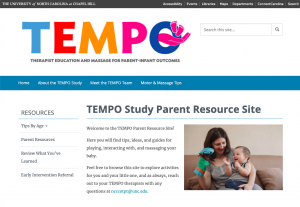 The Value of Early Caregiver Education in the Neonatal Intensive Care Unit
The Value of Early Caregiver Education in the Neonatal Intensive Care Unit
Background
As I began my Doctor of Physical Therapy education at UNC, I had an inkling that I enjoyed the pediatric population. Actually, the whole reason I pursued physical therapy was after volunteering in an inpatient pediatric rehab. Initially I tried to keep an open-mind about all specialties and was set on convincing myself to pursue orthopedics or adult neurology. This quickly changed after my outpatient pediatric clinical and time with my mentor in a pediatric clinic. Once I began hands-on work with children I knew that I was hooked and a career in pediatrics was where I was headed!
Throughout my time in this program, I was able to work with mentors that lead the field of pediatric therapy; Dana McCarty, Cathy Howes, and my clinical instructors. I witnessed the large role that a pediatric therapist can play in these children and family’s lives. This setting opens up opportunities for a therapist to continue their work with the patients and families outside of clinic time, which is a big reason why I have been drawn to working in this setting. I aspire to be knowledgeable in a variety of clinical settings, but specifically become an expert in the pediatric population. I want to be an advocate and resource for the children, their families and the community I am a part of!
Statement of Need and Purpose
There are approximately half a million premature infants born in the United States each year, affecting one of every ten newborns.1,2 Among this population of premature infants, about eighty percent require admission into a Neonatal Intensive Care Unit (NICU).3 Even though there have been great advances in technology to improve survival rates of premature infants, emotional and family burdens still remain extremely high.2,5 In the past, the medical community has under-valued the importance of parent participation in the NICU, and the push for family-centered care has only recently accelerated in the United States.5 
In order to ensure a collaborative environment among the family, infant, and medical team, a family-centered care model needs to be implemented in every NICU. To make certain this occurs, medical professionals should guarantee the family is being educated, making informed decisions, participating with infant care, receiving emotional support, and establishing an adequate transition of care from the NICU to home.5 Although many healthcare providers take part in the care of these families and infants, a physical therapist has the unique opportunity to work hands-on with both the infant and caregivers to successfully prepare the family for life in the NICU and after. In order to implement this demanding task, best-practice recommendations that optimize the outcome of infants and families in the NICU should be established, and resources must be developed that address the infant and families needs. Currently, there is evidence to back up the importance of parental involvement, yet a feasible program or protocol has not been established. Therefore, an evidence-based program needs to be created to provide appropriate care to infants and their caregivers across the nation.
Overview
My capstone was centered around assisting Dana McCarty with her “Therapist Education and Massage for Parent-Infant Outcomes (TEMPO): A feasibility study of a physical therapist-led program for parents of extremely preterm infants.”6 This program is led by therapists and educates caregivers to deliver physical therapy interventions, such as, massage and developmental play during their infant’s hospitalization and in the home setting. The goal of this program is to determine if a TEMPO program would be feasible for parents of infants born in the NICU.6 One part of this program is providing the caregivers with a website full of resources. Some of these resources include guides for playing and interacting with their infant, and tips for massaging their baby. I assisted Dana in creating a parental resource page that provided a plethora of items to help the caregivers find support groups, information on development and care of their infant, financial assistance, emotional support, and more. I also created the early intervention page, where parents can find information about enrolling their child in early intervention therapy.

The second component of my capstone was to gather research that focused on the effects of parental education in the NICU environment. Along with looking into the impact parental education can have on the the outcomes of the infant and parents, I also looked into specific evidenced-based interventions and protocols that therapist can use in the NICU. From this evidence, I created a literature review that can hopefully be used in a future manuscript created by Dana.
Products
This website provides parental resources in terms of infant development, massage techniques, support resources, and further information pertaining to needs of these infants and parents.
* This is a private webpage created for UNC, so please do not share this link* If you know parents or caregivers that could benefit from this information, then contact Dana McCarty for permission.
A Literature Review Discussing the Value of Early Caregiver Education in the Neonatal Intensive Care Unit.
Evaluation
Feedback was given and incorporated throughout the formation of my capstone project from both my advisor and committee members. A final evaluation form was created in order to receive feedback regarding quality of products, usefulness to clinicians and parents, and future opportunities for additions to the products.
Self Assessment
Having the opportunity to spend time in the NICU, and research the NICU environment, has been a very rewarding experience. To begin, it is humbling to witness the precious life of these infants, and to imagine the stress that must come with seeing your child in this position. In this setting, it is evident that the healthcare providers play multiple roles in caring for the child, while also supporting the caregivers. This experience emphasized the importance of providing education and support to not only patients but also to their caregivers. The health of a caregiver ( in adults or children) can effect the outcome of your patient. Therefore, as therapist we must ensure that all needs are being met for both the patient and the individuals in the patients lives.
Also, it has been interesting to dive into what resources are available for NICU parents. I have discovered that a decent amount of material is available online to support parents with premature infants. However, the problem is that this material is very wide spread and not easily discovered. Therefore, someone who is not familiar with healthcare or infants, may have difficulty distinguishing what information was reliable and pertinent. This is why I believe that the TEMPO website will be a very helpful tool for parents. I plan to take this knowledge into my career and ensure that I provide my patients with materials and resources in the most concise way possible. Even a “small” task like this can limit the work load on the caregivers side and hopefully reduce their stress levels.
Acknowledgments
My first thank you goes to my advisor, mentor, and professional role model, Dana McCarty. I have appreciated all your guidance with this project, and thank you your encouragement and time spent working with me. Also, I thank you for being a leader in the field of pediatrics and mentoring us students.It is an honor to work with you and have you as a resource as we go into our careers.
Kerry Blazek & Kristen Montgomery – Thank you for being a part of my committee and dedicating your limited time to assisting me on this project. Also thank you for serving the NICU babies, families and healthcare team with your dedication and expertise.
Debbie Thorpe – a big thanks to you for guiding us through this capstone project and for always being readily available to us. Your quick and informative responses, assistance with brainstorming and project planning, and never ending desire to teach and give us resources ( especially to connect with your patients) has been greatly appreciated!
Class of 2020: I wanna thank y’all for always being encouraging to one another and not competitive ( except in volleyball and game nights…and the roo test). Y’all are the best and I’m thankful to have met and gotten to know you all. Even more so, thankful to have you as colleagues and great resources throughout my career.
References
- Melnyk BM, Feinstein NF, Alpert-Gillis L, et al. Reducing premature infants’ length of stay and improving parents’ mental health outcomes with the Creating Opportunities for Parent Empowerment (COPE) neonatal intensive care unit program: a randomized, controlled trial. Pediatrics. 2006;118(5)
- Dusing SC, Van Drew CM, Brown SE. Instituting parent education practices in the neonatal intensive care unit: an administrative case report of practice evaluation and statewide action. Phys Ther. 2012;92(7):967-975.
- March of Dimes. https://www.marchofdimes.org/peristats/whatsnew.aspx?id=42. Accessed February 26, 2020.
- Seaton SE, Barker L, Draper ES, et al. Estimating neonatal length of stay for babies born very preterm. Arch Dis Child Fetal Neonatal Ed. 2019;104(2):F182-F186. doi:10.1136/archdischild-2017-314405
- Gooding JS, Cooper LG, Blaine AI, Franck LS, Howse JL, Berns SD. Family support and family-centered care in the neonatal intensive care unit: origins, advances, impact. Semin Perinatol. 2011;35(1):20-28.
- McCarty Dana, Protocol Templet: TEMPO: A feasibility study of a physical therapist-led program for parents of extremely preterm infants. 5/10/2019. Accessed 3/25/2020.

2 Responses to “The Value of Early Caregiver Education in the Neonatal Intensive Care Unit”
Dana McCarty
Hi Karla, Great work on a capstone project that spans a lot of information! Your work has been a huge help to the families that enroll in TEMPO and hopefully more in the future.
Debbie Thorpe
Karla
You did a fantastic job on this project. I LOVED the website. The pictures you used were diverse and inviting and the videos were wonderful. Your literature review was complete an evidenced-based. The website and all the resources that you provided will be so valuable to parents and clinicians. I commend you on a wonderful project, in spite of some stressful times!
Best Wishes…..